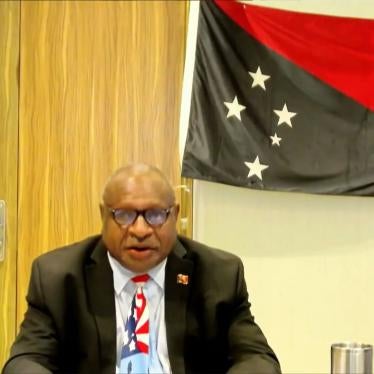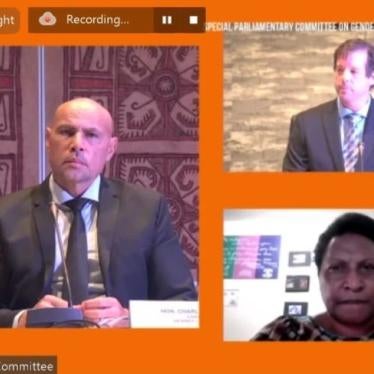Dear Prime Minister O’Neill:
Please accept my regards on behalf of Human Rights Watch, an independent nongovernmental organization that monitors and reports on human rights in more than 90 countries worldwide.
I am writing to you on an issue of great shared concern—the prevalence of family violence, particularly against women and girls, in Papua New Guinea and your government’s efforts to reduce this violence. Your government has taken important steps to combat family violence, including adoption of the Family Protection Act, establishing police Family and Sexual Violence Units and hospital-based Family Support Centres, and initiating a process to develop a gender-based violence strategy.
Human Rights Watch has recently undertaken research on the topic of family violence in Papua New Guinea, including interviewing people who are survivors of family violence, as well as activists, service providers, and experts. I am writing to share with you the preliminary findings of our research and to request information that can help us ensure that we accurately and fairly reflect the current situation and your government’s efforts in our reporting on this issue. We would be grateful if you could facilitate a response to this information request from the various ministries involved in addressing family violence by September 15, 2015.
Our research was largely focused on the assistance available to survivors of family violence, particularly the response by police and justice officials, as well as the availability of services. We conducted research in both the Central Province and the Highlands. Some of the key concerns we identified include the following:
Impunity for perpetrators of family violence: Our interviews with survivors suggested that police and prosecutors are very rarely prepared to pursue investigations or criminal charges against people who commit family violence, even in cases where the violence is severe, including attempted murder and repeated rape. Interviewees said that police, prosecutors, and courts seem reluctant to treat these cases as criminal matters, preferring to resolve them through mediation and/or the payment of compensation, even when it was clear that this was not the preference of the victim. Police often demanded money (“for fuel”) from victims before they would take action, or simply ignored cases that occurred in rural areas, instructing victims that it was their responsibility to bring the perpetrator to the police. These failures appear to occur in Family Sexual Violence Units as well as other police units.
Underutilization of protection orders: Experts and organizations reported that survivors of violence were rarely able to secure interim protection orders (IPOs) and other forms of protection orders. Nongovernmental organizations that support victims said that police often seem reluctant to refer survivors for IPOs in cases where they would have been appropriate. Survivors whom we interviewed who did seek IPOs and protection orders often said they encountered delays in the courts.
Lack of services: There appears to be a dire lack of services for people requiring assistance after having suffered family violence. Safe houses are absent in most areas and in short supply everywhere, qualified counsellors are all but non-existent, case management is not provided, legal aid is almost entirely absent, and there is no safety net to assist survivors, especially those with dependent children, who need temporary support and assistance to leave their abusers and become financially independent. Moreover, we are concerned about courts mandating mediation for couples in cases of family violence, as this goes against international best practices.
Lack of government leadership: Although your government has taken the critical steps mentioned above, we were struck by the fact that much of the leadership on trying to end family violence in Papua New Guinea seems to be coming from activists outside the government with support from international donors. While these actors have critical roles to play, family violence cannot be systemically tackled without full engagement and leadership by your government.
While in Papua New Guinea, we requested meetings with government officials responsible for addressing family violence. We were unable to secure meetings, but we hope that we can have a dialogue moving forward. As a first step, we would welcome any reactions to our preliminary findings above. In addition, we would appreciate receiving the data and information requested below:
- When do you expect to instruct police and justice officials to begin to enforce the Family Protection Act (FPA)?
- What plans do you have for ensuring that police, prosecutors, and courts—both district and village—fully enforce the FPA? Have there been any disciplinary measures or other sanctions against officials who have failed to enforce the law?
- Please describe any complaint mechanisms available for family violence survivors to lodge grievances about officials involved in responding to family violence.
- Please provide the following data on family violence cases for the years 2013 - 2015:
- Number of family violence complaints filed with police
- Number of arrests for family violence crimes
- Number of IPOs sought and issued
- Number of protection orders sought and issued
- Data on violations of such orders
- Number of investigations
- Number of prosecutions
- Number of convictions
- Number of acquittals
- Sentenced handed down (length of prison sentences; data on fines)
- Number of cases dropped by prosecutors and referred to village courts
- Demographic data on defendants and victims (gender, age, education, marital status, pregnancy status, disability, area of residence, etc.)
- Please provide data on the health system response to family violence, including:
- Data on injuries or deaths associated with domestic violence
- Data on referrals to specialized medical care
- Number of forensic examinations for family violence cases
- Number of psychological and psychiatric examinations of domestic violence survivors
- Data on access to post-rape care, including for survivors of marital rape
- Please provide data on government budget allocations to address family violence by ministry, type of activity or service funded, and by location. Please indicate what proportion of this funding is derived from foreign aid.
- What plans does the government have for expanding services for survivors of family violence, including safe houses, psychological counselling, case management, and legal aid?
- Please provide information on government efforts to train officials involved in responding to domestic violence, including numbers of police, health officials, prosecutors, and judges who have participated in such trainings.
- Does the government have plans to provide financial assistance (and help with transitioning to financial independence) to survivors of family violence who are indigent and/or financially dependent on their abusers?
- What government efforts are currently underway and planned to raise public awareness about the fact that family violence is a crime and to explain to victims how they can access help?
We also welcome any other responses or information you are prepared to share on this topic.
The findings of our research will be published in the coming months in a Human Rights Watch report. We would gladly include any response you provide to this letter, but in order to do so we would need to receive the response by September 15, 2015. Please feel free to contact me at XXXXX.
We sincerely hope that you and your government will engage in a dialogue with us about the crucial issue of family violence. We would be very grateful for the opportunity to work together with you to try to end family violence improve the lives of women and girls in Papua New Guinea.
Sincerely,
Janet Walsh
Acting Director of Women’s Rights
Cc: Ministry of Foreign Affairs, Ministry of Development, Ministry of Police, Ministry of Justice and Attorney General







